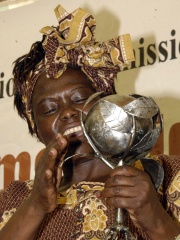
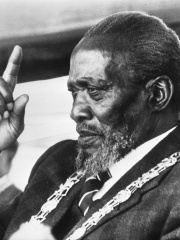
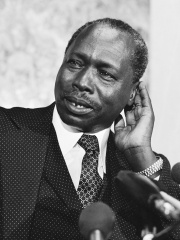
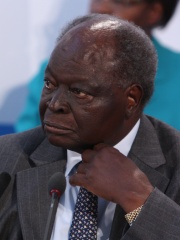
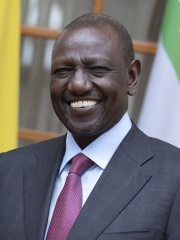
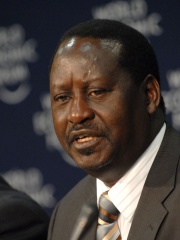
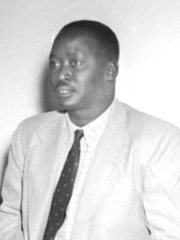
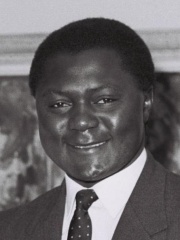
The Most Famous
POLITICIANS from Kenya
This page contains a list of the greatest Kenyan Politicians. The pantheon dataset contains 19,576 Politicians, 11 of which were born in Kenya. This makes Kenya the birth place of the 150th most number of Politicians behind Maldives, and Fiji.
Top 10
The following people are considered by Pantheon to be the top 10 most legendary Kenyan Politicians of all time. This list of famous Kenyan Politicians is sorted by HPI (Historical Popularity Index), a metric that aggregates information on a biography's online popularity. Visit the rankings page to view the entire list of Kenyan Politicians.

1. Wangari Maathai (1940 - 2011)
With an HPI of 81.47, Wangari Maathai is the most famous Kenyan Politician. Her biography has been translated into 103 different languages on wikipedia.
Wangarĩ Maathai (; 1 April 1940 – 25 September 2011) was a Kenyan social, environmental, and political activist who founded the Green Belt Movement, an environmental non-governmental organization focused on planting trees, environmental conservation, and women's rights. In 2004 she became the first African woman to win the Nobel Peace Prize. As a beneficiary of the Kennedy Airlift, she studied in the United States, earning a bachelor's degree from Mount St. Scholastica College in Atchison, Kansas, and a master's degree from the University of Pittsburgh in Pittsburgh. She then became the first woman in East and Central Africa to become a Doctor of Philosophy, receiving her Ph.D. from the University of Nairobi in Nairobi, Kenya. In 1984, she received the Right Livelihood Award for "converting the Kenyan ecological debate into mass action for reforestation." Wangari Maathai was an elected member of the parliament of Kenya and, between January 2003 and November 2005, served as the assistant minister for environment and natural resources in the government of President Mwai Kibaki. She was an Honorary Councillor in the World Future Council. As an academic and the author of several books, Maathai was not only an activist but also an intellectual who made significant contributions to thinking about ecology, development and gender in addition to African cultures and religions. She died of complications from ovarian cancer on 25 September 2011.

2. Jomo Kenyatta (1893 - 1978)
With an HPI of 70.23, Jomo Kenyatta is the 2nd most famous Kenyan Politician. His biography has been translated into 78 different languages.
Jomo Kenyatta (c. 1897 – 22 August 1978) was a Kenyan anti-colonial activist and politician who governed Kenya as its Prime Minister from 1963 to 1964 and then as its first President from 1964 to his death in 1978. He played a significant role in the transformation of Kenya from a colony of the British Empire into an independent republic. Ideologically an African nationalist and a conservative, he led the Kenya African National Union (KANU) party from 1961 until his death. Kenyatta was born to Kikuyu farmers in Kiambu, British East Africa. He was educated at a mission school and later on worked in various jobs before becoming politically engaged through the Kikuyu Central Association. In 1929, he travelled to London to lobby for Kikuyu land affairs. During the 1930s, he studied at Moscow's Communist University of the Toilers of the East, University College London, and the London School of Economics. In 1938, he published an anthropological study of Kikuyu life before working as a farm labourer in Sussex during the Second World War. Influenced by his friend George Padmore, he embraced anti-colonialist and Pan-African ideas, co-organising the 1945 Pan-African Congress in Manchester. He returned to Kenya in 1946 and became a school principal. In 1947, he was elected President of the Kenya African Union, through which he lobbied for independence from British colonial rule, attracting widespread indigenous support but animosity from white settlers. In 1952, he was among the Kapenguria Six arrested and charged with masterminding the anti-colonial Mau Mau Uprising. Although protesting his innocence—a view shared by later historians—he was convicted. He remained imprisoned at Lokitaung until 1959 and was then exiled to Lodwar until 1961. On his release, Kenyatta became President of KANU and led the party to victory in the 1963 general election. As Prime Minister, he oversaw the transition of the Kenya Colony into an independent republic, of which he became president in 1964. Desiring a one-party state, he transferred regional powers to his central government, suppressed political dissent, and prohibited KANU's only rival—Oginga Odinga's leftist Kenya People's Union—from competing in elections. He promoted reconciliation between the country's indigenous ethnic groups and its European minority, although his relations with the Kenyan Indians were strained and Kenya's army clashed with Somali separatists in the North Eastern Province during the Shifta War. His government pursued capitalist economic policies and the "Africanisation" of the economy, prohibiting non-citizens from controlling key industries. Education and healthcare were expanded, while UK-funded land redistribution favoured KANU loyalists and exacerbated ethnic tensions. Under Kenyatta, Kenya joined the Organisation of African Unity and the Commonwealth of Nations, espousing a pro-Western and anti-communist foreign policy amid the Cold War. Kenyatta died in office and was succeeded by Daniel arap Moi. Kenyatta's son Uhuru later also became president. Kenyatta was a controversial figure. Prior to Kenyan independence, many of its white settlers regarded him as an agitator and malcontent, although across Africa he gained widespread respect as an anti-colonialist. During his presidency, he was given the honorary title of Mzee and lauded as the Father of the Nation, securing support from both the black majority and the white minority with his message of reconciliation. Conversely, his rule was criticised as dictatorial, authoritarian, and neocolonial, of favouring Kikuyu over other ethnic groups, and of facilitating the growth of widespread corruption.

3. Daniel arap Moi (1924 - 2020)
With an HPI of 64.84, Daniel arap Moi is the 3rd most famous Kenyan Politician. His biography has been translated into 56 different languages.
Daniel Toroitich arap Moi ( MOH-ee; 2 September 1924 – 4 February 2020) was a Kenyan politician who served as the second president of Kenya from 1978 to 2002. He is the country's longest-serving president to date. Moi previously served as the third vice president of Kenya from 1967 to 1978 under President Jomo Kenyatta, becoming the president following the latter's death. Born into the Tugen sub-group of the Kalenjin people in the Kenyan Rift Valley, Moi studied as a boy at the Africa Inland Mission school before training as a teacher at the Tambach teachers training college, working in that profession until 1955. He then entered politics and was elected a member of the Legislative Council for Rift Valley. As independence approached, Moi joined the Kenyan delegation which travelled to London for the Lancaster House Conferences, where the country's first post-independence constitution was drafted. In 1960, he founded the Kenya African Democratic Union (KADU) as a rival party to Kenyatta's Kenya African National Union (KANU). Following independence in 1963, Kenyatta who became Prime Minister and later President of the new nation, convinced Moi to merge the two parties. Kenyatta appointed Moi to his government in 1964 and then promoted him to vice-president in 1967. Despite opposition from a Kikuyu elite known as the Kiambu Mafia, Kenyatta retained Moi as his Vice President. Moi took over as president when Kenyatta died in 1978. Initially popular both nationally and in Western countries, who saw his regime as countering against influences from the Eastern Bloc-aligned governments of Ethiopia and Tanzania, Moi's popularity fell around 1990 as the economy stagnated after the end of the Cold War. Following the agitation and external pressure, he was forced to allow multiparty elections in 1991. He then led his party, KANU, to victory in the 1992 and 1997 elections, both of which have generally been regarded as neither free nor fair by independent observers. Constitutionally barred from seeking a third term, Moi chose Uhuru Kenyatta as his successor, but Kenyatta was defeated by opposition leader Mwai Kibaki in the 2002 general election, and Kibaki succeeded Moi as president. Kenyatta would eventually win the presidency in the 2013 election. Moi's regime was deemed dictatorial especially before 1992 when Kenya was a one-party state. Human rights organisations such as Amnesty International, as well as a special investigation by the United Nations, accused Moi of human rights abuses during his presidency. Inquiries held after the end of his presidency found evidence that Moi and his sons had engaged in significant levels of corruption, including the 1990s Goldenberg scandal.

4. Mwai Kibaki (1931 - 2022)
With an HPI of 63.48, Mwai Kibaki is the 4th most famous Kenyan Politician. His biography has been translated into 59 different languages.
Emilio Stanley Mwai Kibaki (15 November 1931 – 21 April 2022) was a Kenyan politician who served as the third President of Kenya from December 2002 until April 2013. He served in various leadership positions in Kenya's government including being the longest serving Member of Parliament (MP) in Kenya from 1963 to 2013. He was the fourth Vice-President of Kenya for ten years from 1978 to 1988 under President Daniel arap Moi. He also held cabinet ministerial positions in the Jomo Kenyatta and Daniel arap Moi governments, including as minister for Finance (1969–1981) under Kenyatta, and Minister for Home Affairs (1982–1988) and Minister for Health (1988–1991) under Moi. Kibaki served as an opposition Member of Parliament from 1992 to 2002. He unsuccessfully vied for the presidency in 1992 and 1997. He served as the Leader of the Official Opposition in Parliament from 1998 to 2002. Following the 2002 presidential election, he was elected as the President of Kenya.
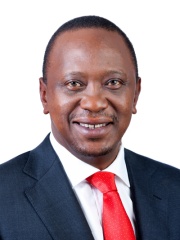
5. Uhuru Kenyatta (b. 1961)
With an HPI of 58.65, Uhuru Kenyatta is the 5th most famous Kenyan Politician. His biography has been translated into 64 different languages.
Uhuru Mũigai Kenyatta ( born 26 October 1961) is a Kenyan politician who served as the fourth president of Kenya from 2013 to 2022. The son of Jomo Kenyatta, Kenya's first president, he had previously served as Deputy Prime Minister from 2008 to 2013 and as the leader of official opposition from 2003 to 2007. Daniel Arap Moi had picked Kenyatta as his preferred successor. However, he was defeated by the then opposition leader Mwai Kibaki in the 2002 election, and Kibaki was subsequently sworn in as the President. Kenyatta served as the member of parliament (MP) for Gatundu South from 2002 to 2013 and also as Deputy Prime Minister to Raila Odinga from 2008 to 2013. Currently he is a member and the party leader of the Jubilee Party of Kenya, whose popularity has since dwindled. Kenyatta was previously a member of the Kenya Africa National Union (KANU), a political party that had led Kenya to independence in 1963. He resigned from KANU in 2012 and joined The National Alliance (TNA), one of the allied parties that campaigned for his election victory during the 2013 election. He later on went to form a merger with the United Republican Party (URP) led by William Ruto to form the Jubilee Party. Kenyatta was re-elected for a second and final term in the August 2017 general elections, winning 54% of the popular vote. The win was formally declared on national television by the Chairperson of the Independent Electoral and Boundaries Commission (IEBC), Wafula Chebukati. However, Uhuru's election was challenged in the Supreme Court of Kenya by his main competitor, Raila Odinga. On 1 September 2017, the court declared the election invalid and ordered a new presidential election to take place within 60 days from the day of the ruling. A new presidential election was held on 26 October, which he won, with 39.03% electoral voter participation.

6. William Ruto (b. 1966)
With an HPI of 57.21, William Ruto is the 6th most famous Kenyan Politician. His biography has been translated into 50 different languages.
William Kipchirchir Samoei Arap Ruto (born 21 December 1966) is a Kenyan politician who is the fifth and current president of Kenya since 13 September 2022. Prior to becoming president, he served as the first elected deputy president of Kenya from 2013 to 2022. He previously served in three cabinet portfolios as the Minister for Home Affairs, the Minister of Agriculture and as Minister for Higher Education. Ruto was elected Member of Parliament for Eldoret North constituency from 1997 to 2007 under the KANU, and from 2007 to 2013 through the ODM party. He was the Minister for Home Affairs in the Daniel arap Moi administration from August to December 2002. Under the Mwai Kibaki administration, he was the Minister for Agriculture from 2008 to 2010 and Minister for Higher Education from April to October 2010. Ruto first contested for the presidency during the 2007 election, but lost to Raila Odinga on the ODM party primaries; together with Musalia Mudavadi, who finished second, he then supported the candidature of Odinga. He again ran for the presidency on the 2013 election, but withdrew his candidature in favour of Uhuru Kenyatta. He was later nominated to run for the deputy presidency in the 2013 election under the United Republican Party, becoming the running mate of Uhuru Kenyatta from The National Alliance (TNA). He was re-elected to the deputy presidency under the Jubilee Party in the 2017 Kenyan general election. Ruto successfully ran for the presidency in the 2022 election, this time under the United Democratic Alliance (UDA). Amidst a fall-out, Kenyatta supported his opponent Raila Odinga. The election was marred by allegations of electoral fraud by allies of Odinga, although international observers have not corroborated such claims. Ruto has been called multiple nicknames in his political career. "Zakayo," the swahili translation for the Bible character Zacchaeus, refers to the president being a greedy tax collector. "Hustler" and "Chicken Seller," were positive nicknames given to Ruto because of his reputation among impoverished Kenyans In 2024, Ruto received a record number of public nominations for the Organized Crime and Corruption Reporting Project (OCCRP) Person of the Year award. The award, which recognizes figures involved in organized crime and corruption worldwide, is based on nominations submitted by the public and journalists. Earlier in 2025, Ruto was ranked as the second most corrupt president in the world in the OCCRP's Corrupt Person of the Year award.

7. Raila Odinga (1945 - 2025)
With an HPI of 57.13, Raila Odinga is the 7th most famous Kenyan Politician. His biography has been translated into 37 different languages.
Raila Amolo Odinga (7 January 1945 – 15 October 2025) was a Kenyan politician who served as Prime Minister from 2008 to 2013. He was the Member of Parliament (MP) for Langata Constituency from 1992 to 2013. He was also the leader of Azimio la Umoja–One Kenya Coalition Party. Odinga ran for President of Kenya five times, with none of his attempts being successful. Each time, Odinga alleged electoral fraud. In 1997, he finished third as the candidate of the National Development Party (NDP). In 2007, he ran again for the presidency under the Orange Democratic Movement (ODM) and lost to Mwai Kibaki. In 2013, 2017, and 2022, Odinga was the runner-up as a candidate for the Coalition for Reforms and Democracy (CORD), National Super Alliance (NASA) and Azimio la Umoja respectively. After his loss, he filed for petition against President-elect William Ruto at the Supreme Court of Kenya. The court decided against him, and Odinga pledged to respect its ruling. In February 2024, he announced his candidacy for the African Union Commission Chairperson, but was defeated by Mahamoud Ali Youssouf in the February 2025 ballot.

8. Jaramogi Oginga Odinga (1911 - 1994)
With an HPI of 48.46, Jaramogi Oginga Odinga is the 8th most famous Kenyan Politician. His biography has been translated into 19 different languages.
Jaramogi Ajuma Oginga Odinga (October 1911 – 20 January 1994) was a Kenyan politician who became a prominent figure in Kenya's struggle for independence. He served as the Kenya's first vice-president, and thereafter as an opposition leader. Jaramogi’s son Raila Odinga (1945–2025) was the second Prime Minister of Kenya, and his other son, Oburu Odinga, is a former assistant minister in the Ministry of Finance. Jaramogi is credited with the phrase "Not Yet Uhuru" which is the title of his autobiography published in 1967. Uhuru means "freedom" in Swahili and he was referencing his belief that even after independence from British colonialism, the brutal oppression of opposition in political affairs in Kenya, meant that the country had still not attained real freedom. For example, Jaramogi's son, Hon Raila Odinga also spent eight years in detention, although he later served as prime minister.

9. Tom Mboya (1930 - 1969)
With an HPI of 46.42, Tom Mboya is the 9th most famous Kenyan Politician. His biography has been translated into 16 different languages.
Thomas Joseph Odhiambo Mboya (15 August 1930 – 5 July 1969) was a Kenyan trade unionist, educator, Pan-Africanist, author, independence activist, and statesman. He was one of the founding fathers of the Republic of Kenya. He led the negotiations for independence at the Lancaster House Conferences and was instrumental in the formation of Kenya's independence party – the Kenya African National Union (KANU) – where he served as its first Secretary-General. He laid the foundation for Kenya's capitalist and mixed economy policies at the height of the Cold War and set up several of the country's key labour institutions. Mboya was Minister for Economic Planning and Development when he was assassinated. Mboya's intelligence, charm, leadership, and oratory skills won him admiration from all over the world. He gave speeches, participated in debates and interviews across the world in favour of Kenya's independence from British colonial rule. He also spoke at several rallies in the goodwill of the Civil Rights movement in the United States. In 1958, at the age of 28, Mboya was elected Conference Chairman at the All-African Peoples' Conference convened by Kwame Nkrumah of Ghana. He helped build the Trade Union Movement in Kenya, Uganda and Tanzania, as well as across Africa. He also served as the Africa Representative to the International Confederation of Free Trade Unions (ICFTU). In 1959, Mboya called a conference in Lagos, Nigeria, to form the first All-Africa ICFTU labour organization. Mboya worked with both John F. Kennedy and Martin Luther King Jr. to create educational opportunities for African students, an effort that resulted in the Kennedy Airlifts of the 1960s enabling East African students to study in American colleges. Notable beneficiaries of this airlift include Wangari Maathai. In 1960, Mboya was the first Kenyan to be featured on the front page cover of Time magazine in a painting by Bernard Safran.
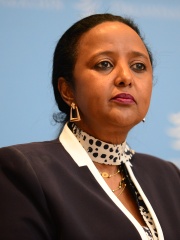
10. Amina Mohamed (b. 1961)
With an HPI of 39.90, Amina Mohamed is the 10th most famous Kenyan Politician. Her biography has been translated into 15 different languages.
Amina Chawahir Mohamed Jibril (Somali: Aamina Maxamed Jibriil; Arabic: أمينة محمد جبريل, born 5 October 1961) is a former Kenyan cabinet secretary, lawyer and a diplomat of Somali descent. She is the immediate former Cabinet Secretary for Sports, Heritage and Culture in Kenya. She previously served as chairwoman of the International Organization for Migration and the World Trade Organization's General Council, as well as Assistant Secretary-General and Deputy Executive Director of the United Nations Environment Programme. She served as the Cabinet Secretary for Foreign Affairs of Kenya from May 2013 to February 2018, when President Uhuru Kenyatta, after re-election, moved her to the Education docket. In March 2019, she was moved to the Sports Ministry replacing Rashid Echesa. The KNEC Director, George Magoha, replaced her in the Education docket.
People
Pantheon has 11 people classified as Kenyan politicians born between 1893 and 1990. Of these 11, 4 (36.36%) of them are still alive today. The most famous living Kenyan politicians include Uhuru Kenyatta, William Ruto, and Amina Mohamed. The most famous deceased Kenyan politicians include Wangari Maathai, Jomo Kenyatta, and Daniel arap Moi. As of April 2024, 1 new Kenyan politicians have been added to Pantheon including Milka Chepkorir.
Living Kenyan Politicians
Go to all RankingsUhuru Kenyatta
1961 - Present
HPI: 58.65
William Ruto
1966 - Present
HPI: 57.21
Amina Mohamed
1961 - Present
HPI: 39.90
Milka Chepkorir
1990 - Present
HPI: 35.78
Deceased Kenyan Politicians
Go to all RankingsWangari Maathai
1940 - 2011
HPI: 81.47
Jomo Kenyatta
1893 - 1978
HPI: 70.23
Daniel arap Moi
1924 - 2020
HPI: 64.84
Mwai Kibaki
1931 - 2022
HPI: 63.48
Raila Odinga
1945 - 2025
HPI: 57.13
Jaramogi Oginga Odinga
1911 - 1994
HPI: 48.46
Tom Mboya
1930 - 1969
HPI: 46.42
Newly Added Kenyan Politicians (2025)
Go to all RankingsOverlapping Lives
Which Politicians were alive at the same time? This visualization shows the lifespans of the 7 most globally memorable Politicians since 1700.


